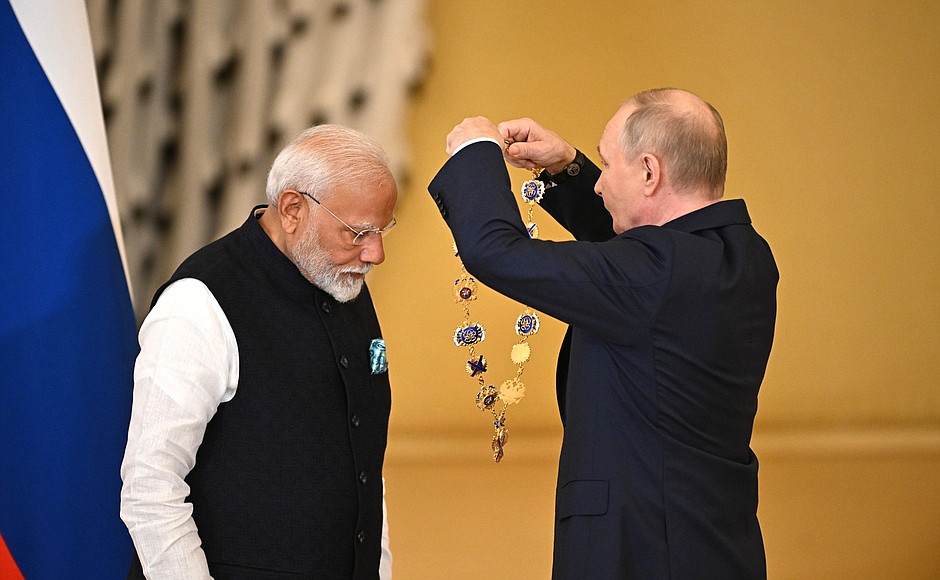
Russian President Vladimir Putin presents the Order of St Andrew the Apostle to Prime Minister of India Narendra Modi. Photo credit: Sergei Bobylev, RIA Novosti
Moscow: Russian President Vladimir Putin today conferred Russia’s highest state award “The Order of St. Andrew the Apostle” on Indian Prime Minister Narendra Modi for his contribution to fostering India-Russia ties, in a special ceremony in St. Andrew Hall in the Kremlin. The award was announced in 2019.
Narendra Modi is the first Indian leader to be conferred with this award which was instituted over 300 years ago.
The Indian Prime Minister, who was on an official visit to the Russian Federation on July 8-9, 2024 at the invitation of Putin for the 22nd India – Russia Annual Summit, dedicated the award to the people of India and the traditional bonds of friendship between India and Russia. He stated that the recognition illuminates the Special and Privileged Strategic Partnership between the two countries.
Earlier today, President Putin and Prime Minister Narendra Modi held talks in the Grand Kremlin Palace. The talks focused on the future development of the traditionally friendly relations between Russia and India, as well as the topical issues on the international and regional agendas, Kremlin stated.
A joint statement of the leaders of the Russian Federation and the Republic of India was also issued on developing strategic areas of bilateral economic cooperation until 2030, as well as a Joint Statement following the 22nd Russia-India: Enduring and Expanding Partnership annual summit.
India and Russia have identified the following nine key areas of bilateral economic cooperation:
1. Aspiration for elimination of non-tariff trade barriers related to bilateral trade between India and Russia. Continuation of dialogue in the field of liberalization of bilateral trade, including the possibility of the establishment of the Eurasian Economic Union (EAEU) -India Free Trade Area. Achievement of a mutual trade volume of more than 100 billion US dollars by 2030 (as mutually agreed), including increased supplies of goods from India to achieve balanced bilateral trade. Reinvigoration of investment activities of the Parties, i.e. within the framework of the special investment regimes.
2. Development of a bilateral settlement system using national currencies. Consistent introduction of digital financial instruments into mutual settlements.
3. Increase of cargo turnover with India through the launch of new routes of the North-South International Transport Corridor, the Northern Sea Route and the Chennai-Vladivostok Sea Line. Optimization of customs procedures through the application of intelligent digital systems for barrier-free movement of goods.
4. Increase the volume of bilateral trade in agricultural products, food and fertilizers. Maintenance of an intensive dialogue aimed at removing veterinary, sanitary and phytosanitary restrictions and prohibitions.
5. Development of cooperation in key energy sectors, including nuclear energy, oil refining and petrochemicals and expanded forms of cooperation and partnership in the field of energy infrastructure, technologies and equipment. Facilitation of mutual and international energy security, by taking into account the prospects of global energy transition.
6. Strengthening of interaction in the fields of infrastructure development, transport engineering, automobile production and shipbuilding, space and other industrial sectors. Facilitation of entry of Indian and Russian companies in each other’s markets by creating subsidiaries and industrial clusters. Convergence of approaches of the Parties in the fields of standardization, metrology and conformity assessment.
7. Promotion of investments and joint projects across various sectors of the digital economy, science and research, educational exchanges and internships for employees of high-tech companies. Facilitation of the creation of new joint (subsidiary) companies by providing them with favourable fiscal regimes.
8. Promotion of systematic cooperation in the development and supply of medicines and advanced medical equipment. Studying the possibility of opening branches of Indian medical institutions in Russia and recruiting qualified medical personnel as well as strengthening coordination in the field of medical and biological safety.
9. Development of humanitarian cooperation, and consistent expansion of interaction in the fields of education, science and technology, culture, tourism, sports, healthcare and other areas.
A number of bilateral documents were also signed during the summit.
A programme was signed on Russian-Indian cooperation in trade, economic and investment spheres in the Russian Far East for 2024–2029, and on the principles of cooperation in the Arctic zone of the Russian Federation.
Inter-agency documents were signed concerning issues of climate change and low-carbon development, geodesy and cartography, healthcare and pharmaceuticals, scientific research and logistics in the polar regions, and cooperation in the field of television broadcasting. A number of signed agreements concern investment and arbitration issues.
In addition, memorandums of understanding between the all-Russia Public Organisation Delovaya Rossiya (Business Russia) and the Trade Promotion Council of India, as well as between the National Research University Higher School of Economics (Russia) and Jawaharlal Nehru University (New Delhi, India).
Putin and Narendra Modi held a thorough exchange of views on current issues of bilateral practical cooperation and the development of the Russia-India Special and Privileged Strategic Partnership, “firmly” adhering to the principles of mutual respect and equality.
Both leaders gave additional impetus to the deepening of bilateral interaction by promoting Russia-India trade and economic cooperation, guided by the intention to maintain the trend of dynamic growth of trade in goods and services between the two states and the desire to ensure a significant increase in its volume by 2030.
Putin and Narendra Modi further instructed the Russian-Indian Intergovernmental Commission on Trade, Economic, Scientific, Technical and Cultural Cooperation to study the identified priority areas and to assess the progress at its next meeting.
– global bihari bureau




